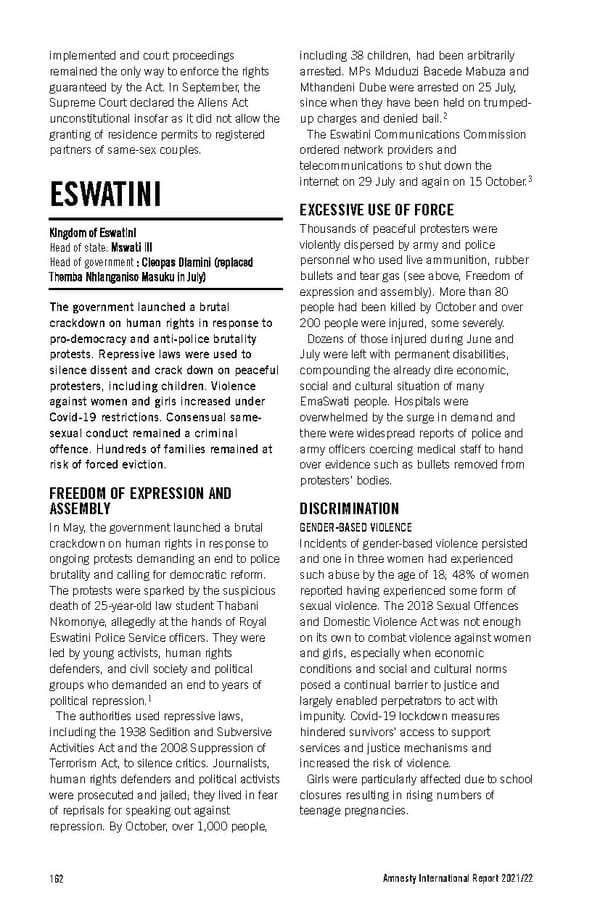implemented and court proceedings including 38 children, had been arbitrarily remained the only way to enforce the rights arrested. MPs Mduduzi Bacede Mabuza and guaranteed by the Act. In September, the Mthandeni Dube were arrested on 25 July, Supreme Court declared the Aliens Act since when they have been held on trumped- unconstitutional insofar as it did not allow the up charges and denied bail.2 granting of residence permits to registered The Eswatini Communications Commission partners of same-sex couples. ordered network providers and telecommunications to shut down the ESWATINI internet on 29 July and again on 15 October.3 EXCESSIVE USE OF FORCE Kingdom of Eswatini Thousands of peaceful protesters were Head of state: Mswati III violently dispersed by army and police Head of government : Cleopas Dlamini (replaced personnel who used live ammunition, rubber Themba Nhlanganiso Masuku in July) bullets and tear gas (see above, Freedom of expression and assembly). More than 80 The government launched a brutal people had been killed by October and over crackdown on human rights in response to 200 people were injured, some severely. pro-democracy and anti-police brutality Dozens of those injured during June and protests. Repressive laws were used to July were left with permanent disabilities, silence dissent and crack down on peaceful compounding the already dire economic, protesters, including children. Violence social and cultural situation of many against women and girls increased under EmaSwati people. Hospitals were Covid-19 restrictions. Consensual same- overwhelmed by the surge in demand and sexual conduct remained a criminal there were widespread reports of police and offence. Hundreds of families remained at army officers coercing medical staff to hand risk of forced eviction. over evidence such as bullets removed from FREEDOM OF EXPRESSION AND protesters’ bodies. ASSEMBLY DISCRIMINATION In May, the government launched a brutal GENDER-BASED VIOLENCE crackdown on human rights in response to Incidents of gender-based violence persisted ongoing protests demanding an end to police and one in three women had experienced brutality and calling for democratic reform. such abuse by the age of 18; 48% of women The protests were sparked by the suspicious reported having experienced some form of death of 25-year-old law student Thabani sexual violence. The 2018 Sexual Offences Nkomonye, allegedly at the hands of Royal and Domestic Violence Act was not enough Eswatini Police Service officers. They were on its own to combat violence against women led by young activists, human rights and girls, especially when economic defenders, and civil society and political conditions and social and cultural norms groups who demanded an end to years of posed a continual barrier to justice and political repression.1 largely enabled perpetrators to act with The authorities used repressive laws, impunity. Covid-19 lockdown measures including the 1938 Sedition and Subversive hindered survivors’ access to support Activities Act and the 2008 Suppression of services and justice mechanisms and Terrorism Act, to silence critics. Journalists, increased the risk of violence. human rights defenders and political activists Girls were particularly affected due to school were prosecuted and jailed; they lived in fear closures resulting in rising numbers of of reprisals for speaking out against teenage pregnancies. repression. By October, over 1,000 people, Amnesty International Report 2021/22 162
 Amnesty International Report 2021/22 Page 161 Page 163
Amnesty International Report 2021/22 Page 161 Page 163